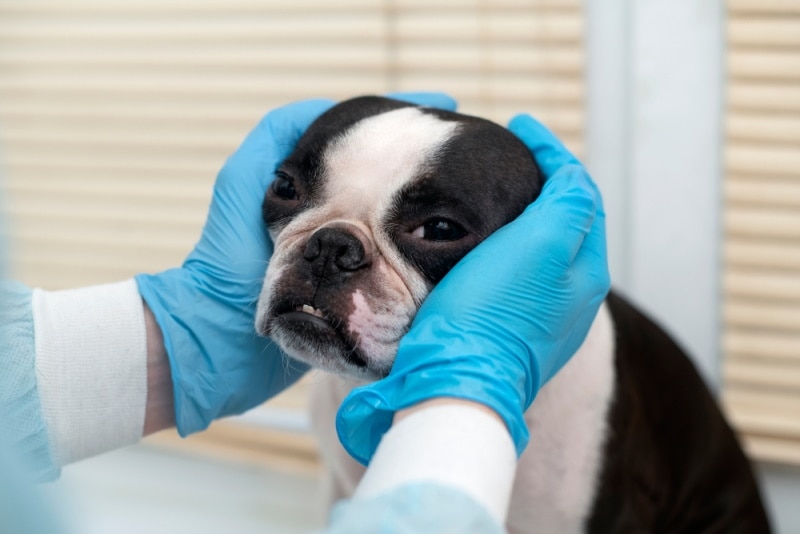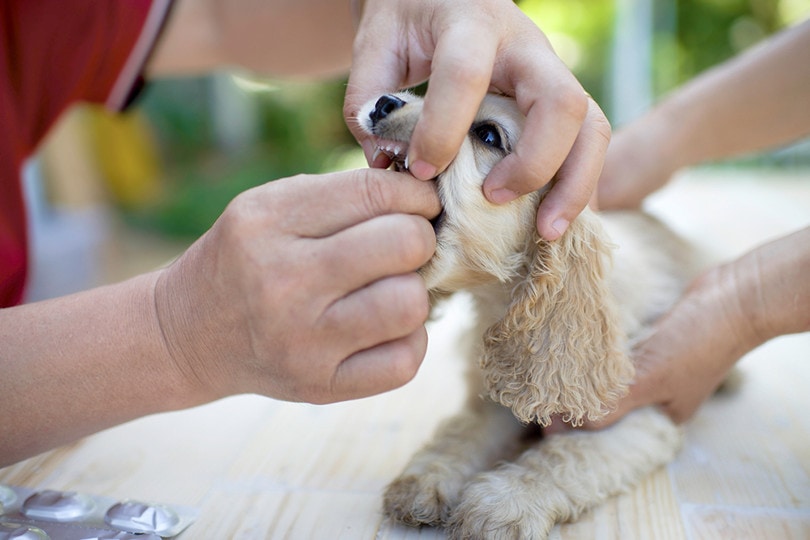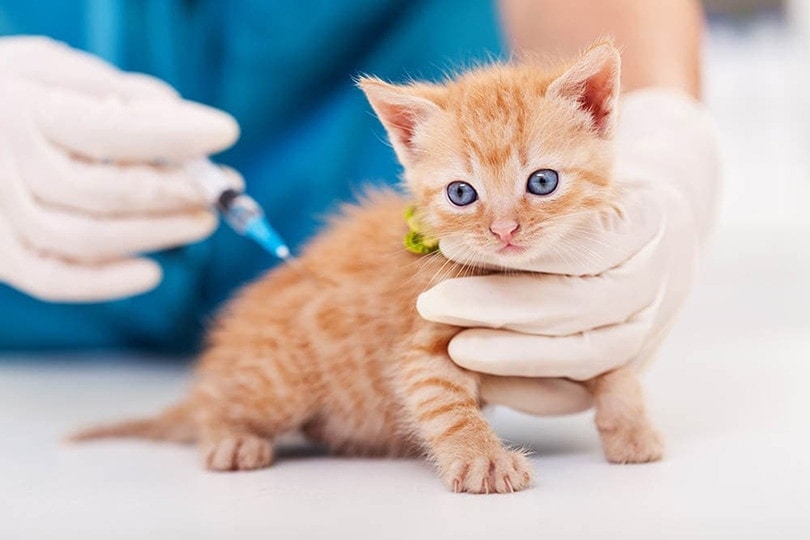Dog Stomach Ulcers: Signs, Causes & Remedies (Vet Answer)
By Dr. Leigh Wilder, DVM (Vet)
Updated on

Stomach ulcers are a common ailment affecting humans and are often associated with symptoms, such as stomach pain, bloating, or nausea. But what about our canine companions? Does this condition affect dogs? And, if so, what signs should an astute owner be on the lookout for?
The following article will discuss stomach ulcers in dogs, including their symptoms, causes, and potential treatments, as well as the diagnostic and prognostic information relevant to this concerning condition.
What Are Stomach Ulcers?
In canines, stomach ulcers initially affect the inner, protective layer of the stomach known as the gastric mucosa. A stomach ulcer (also known as a gastric ulcer) is a defect, or break in this mucosal layer that leads to inflammation, bleeding, and increased acid secretion within the stomach. These changes exacerbate the initial damage to the mucosa by decreasing blood flow and impairing cellular repair of the affected tissue.
As ulceration of the mucosa progresses additional layers of the stomach become affected, and gastric perforation (a hole in the stomach) may ultimately result. Perforated stomach ulcers may lead to septic peritonitis, a life-threatening infection of the abdominal cavity.

What Are the Signs of Stomach Ulcers?
Gastric ulceration in canines may present with the following symptoms:
- Vomiting
- Decreased appetite
- Increased salivation
- Weight loss
- Melena (dark, tarry stool caused by digested blood)
- Lethargy
- Abdominal pain
Out of the above-noted signs, vomiting is the most common symptom associated with gastric ulceration. The appearance of vomitus in affected dogs is variable, and may or may not include blood. If blood is noted, it may either be fresh blood, which can appear bright red in color, or digested blood, which may appear dark with a “coffee grounds” appearance.
Additional signs of advanced, or perforated, stomach ulcers may include weakness, depression, or pale gum color. If noted, these symptoms constitute an emergency and immediate veterinary attention is warranted.

What Are the Causes of Stomach Ulcers?
Numerous causes of gastric ulceration have been identified in canines, and can include:
- Medications, such as non-steroidal anti-inflammatories (NSAIDs) or corticosteroids
- Metabolic disease including hypoadrenocorticism (Addison’s disease), liver or kidney disease
- Cancer, such as lymphosarcoma, gastric adenocarcinoma, mast cell tumors, or gastrinoma
- Foreign body ingestion
- Intervertebral disc disease
- Infectious or inflammatory conditions including pancreatitis and sepsis
- Extreme exercise such as sled dog racing

How Do I Care for a Pet With Stomach Ulcers?
If you are concerned your dog may have a stomach ulcer, an evaluation by a veterinarian is strongly recommended. Once a gastric ulcer has been diagnosed, your veterinarian will work with you to develop a treatment plan appropriate for your pet’s specific case.
Depending on the severity of the ulcer, and whether any underlying medical conditions are present, your dog may either require hospitalization or may be a candidate for outpatient treatment at home. Care for canines affected by stomach ulcers may include the following:
- Treatment of underlying disease. While therapy directed at the ulcer itself is important, identification and correction of the underlying cause of an ulcer is an essential component of treatment. Diagnosis and initiation of therapy for hypoadrenocorticism, for example, may be needed to obtain the best outcome for an affected dog.
- Medications used to reduce gastric acidity. Histamine-2 receptor antagonists or proton-pump inhibitor medications may be used to help heal an area of ulcerated mucosa by decreasing acid production within the stomach.
- Medications used to protect the stomach lining. Sucralfate is an oral medication that protects ulcerated gastric mucosa by binding to areas of ulceration and stimulating mucous secretion, among other beneficial actions.
- Prostaglandin analog Misoprostol, a prostaglandin analog, is another gastroprotective agent that may provide benefit in cases of canine gastric ulceration by both decreasing gastric acidity and increasing mucous production and mucosal blood flow.
- Surger Perforated ulcers or those not responding to medical management may require surgical resection and repair of the affected tissue.
- Supportive care. Supportive care, such as hospitalization, intravenous fluids, and anti-nausea medications may be required in dogs with more severe clinical signs.

Frequently Asked Questions (FAQs)
How Are Stomach Ulcers Diagnosed?
Diagnosis of a gastric ulcer is made by visualization of the ulcer. This may be accomplished either via endoscopy (insertion of a small, flexible scope and camera through the mouth and into the stomach), or exploratory abdominal surgery.
Forms of diagnostic imaging, such as abdominal ultrasound or contrast radiography, may provide information supportive of a gastric ulcer, but are not considered the gold standard for the diagnosis of this condition.
Blood work including a complete blood count and biochemistry profile can also support a diagnosis of gastric ulceration and may show evidence of blood loss, infection, and liver or kidney disease.

Are Certain Dog Breeds Predisposed to Developing Stomach Ulcers?
Canines that participate in elite athletic competition, such as dogs that compete in the Iditarod Sled Dog Race, may be at an increased risk of gastric lesions including ulceration. Aside from this phenomenon, no other predispositions involving age, gender, or breed, have been identified.
What is the Prognosis for Gastric Ulceration in Dogs?
The prognosis for canine stomach ulcers is variable and depends on several factors including the severity of the ulceration, the cause of the ulceration, and how quickly treatment is initiated. Mild ulcers with reversible causes (such as medication administration) that are identified quickly have a more favorable prognosis, while severe or perforating ulcers associated with end-stage medical conditions often carry a poor prognosis.

 Conclusion
Conclusion
In summary, canine stomach ulcers represent a common, yet serious medical issue that may occur secondary to a variety of different disease processes. Prompt identification of an ulcer, addressing the underlying cause, and instituting both specific and supportive care are essential steps needed to produce the best outcome for affected dogs. If you are concerned that your dog may have a stomach ulcer, early collaboration with your veterinarian is recommended to get them on the road to recovery as soon as possible!
See also:
- Lead Poisoning in Dogs: Causes, Signs, and Care (Vet Answer)
- Bump On a Dog’s Eye: Causes, Symptoms, and Care (Vet Answer)
Featured Image Credit: Mylene2401, Pixabay












